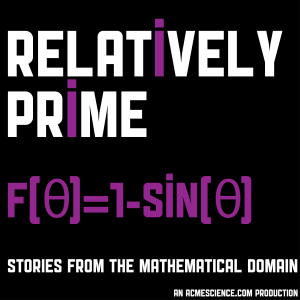I’d have written it as $r = 1 – \theta$, myself, but even then it’s not much of a heart. However, that’s pretty much my biggest gripe about this episode, the penultimate in series 2 of Samuel Hansen’s one-of-a-kind mathematics podcast, Relatively Prime.
Episode 7 is subtitled “Dating in the mathematical domain”, and looks at the maths involved in dating and relationships, and begins with some of the comments Sam’s dating profile received from non-mathematicians. Now, denizens of the dating world: Samuel has many flaws and failings; picking on the fact that he’s a mathematician seems a little arbitrary and unfair, like deciding not to vote for Donald Trump because you don’t like his tie. I have this unfamiliar sensation. Could it be… surely not? It appears that I feel a little sorry for Samuel. Don’t tell him, ok?
The first segment is an interview with Andrea Silenzi of the Why Oh Why podcast, on how she took Tim Harford’s advice on how to filter out potential partners using Skype dates. While it seems like good advice, I’d have liked to hear a little more about the mathematical or economic reasoning behind it.
Second up is Sam Yagan, founder of OKCupid, who does go into the numbers, explaining why the service is set up the way it is, and how the blog decides on which experiments to run. (I wanted to fit a ‘big dater’ joke in here, but I’m groggy with the shingles and lack the mental fortitude to make it work.) A good interview, I thought: a good insight into someone who’s used mathematical modelling to completely disrupt an entire industry.
Who’s this popping up in the third segment? Why, it’s a man who appears to have changed his name to “Matt Parker, author of Things To Make And Do In The Fourth Dimension”. He used to write around here, you know. Anyway, in the interests of doing some actual maths, Matt is here to discuss the Optimal Stopping Problem, one possible way of deciding who to settle down with (under certain, somewhat unilateral, assumptions). Apparently there’s some recent research into the problem that suggests the $\frac{1}{e}$ approach isn’t necessarily the best approach if you don’t want to die alone.
The last guest is John Gottman of the Gottman Institute, who has developed mathematical models for use within relationships — for example, for predicting which behaviours and attitudes to conflict are most likely to lead to couples splitting up.
The episode ends by returning to Andrea Silenzi for a quick discussion about what a date quality prediction formula would look like. Don’t tell the Daily Mail.
This is possibly my favourite episode of the series so far; it didn’t even particularly annoy me. Samuel’s interventions are well-judged between segments, and conversational within them. An excellent topic that got me wondering about what I’d do differently or take further; and left me a little sad that next week’s is the last of the series.
But wait! There’s (potentially) more! As announced on Wrong, But Useful a few weeks ago, Samuel is running a Kickstarter to fund Season 3, which will be on a more sedate release schedule (and worth supporting for that reason alone).
More information
Listen to Relatively Prime: $f(\theta)=1-\sin(\theta)$ at relprime.com. While you’re there, catch up on Season 1.
Colin was given early access to Season 2 of Relatively Prime, in return for writing reviews of each episode. He also met his partner through OKCupid. Furthermore, Samuel is Aperiodipal numero uno and most of us chipped some money into the Relatively Prime Kickstarter, too. Just so you know.
